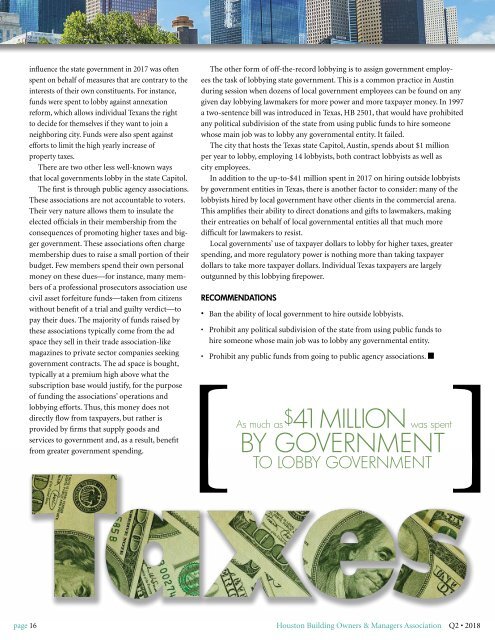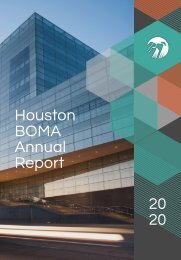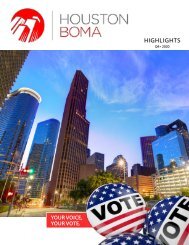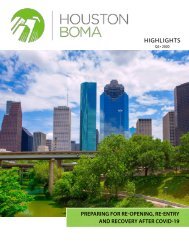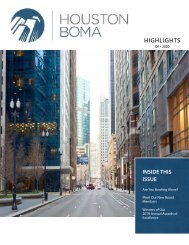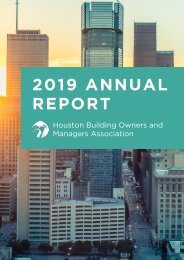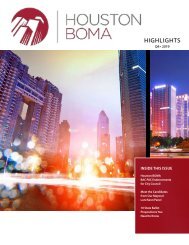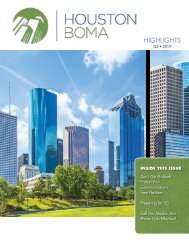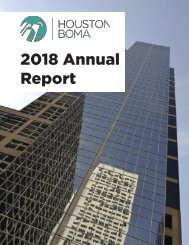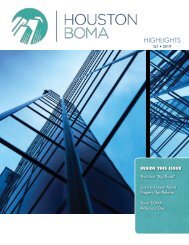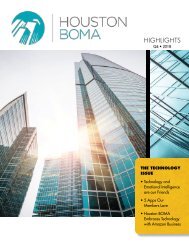Houston BOMA Highlights, Q2 2018
You also want an ePaper? Increase the reach of your titles
YUMPU automatically turns print PDFs into web optimized ePapers that Google loves.
influence the state government in 2017 was often<br />
spent on behalf of measures that are contrary to the<br />
interests of their own constituents. For instance,<br />
funds were spent to lobby against annexation<br />
reform, which allows individual Texans the right<br />
to decide for themselves if they want to join a<br />
neighboring city. Funds were also spent against<br />
efforts to limit the high yearly increase of<br />
property taxes.<br />
There are two other less well-known ways<br />
that local governments lobby in the state Capitol.<br />
The first is through public agency associations.<br />
These associations are not accountable to voters.<br />
Their very nature allows them to insulate the<br />
elected officials in their membership from the<br />
consequences of promoting higher taxes and bigger<br />
government. These associations often charge<br />
membership dues to raise a small portion of their<br />
budget. Few members spend their own personal<br />
money on these dues—for instance, many members<br />
of a professional prosecutors association use<br />
civil asset forfeiture funds—taken from citizens<br />
without benefit of a trial and guilty verdict—to<br />
pay their dues. The majority of funds raised by<br />
these associations typically come from the ad<br />
space they sell in their trade association-like<br />
magazines to private sector companies seeking<br />
government contracts. The ad space is bought,<br />
typically at a premium high above what the<br />
subscription base would justify, for the purpose<br />
of funding the associations’ operations and<br />
lobbying efforts. Thus, this money does not<br />
directly flow from taxpayers, but rather is<br />
provided by firms that supply goods and<br />
services to government and, as a result, benefit<br />
from greater government spending.<br />
The other form of off-the-record lobbying is to assign government employees<br />
the task of lobbying state government. This is a common practice in Austin<br />
during session when dozens of local government employees can be found on any<br />
given day lobbying lawmakers for more power and more taxpayer money. In 1997<br />
a two-sentence bill was introduced in Texas, HB 2501, that would have prohibited<br />
any political subdivision of the state from using public funds to hire someone<br />
whose main job was to lobby any governmental entity. It failed.<br />
The city that hosts the Texas state Capitol, Austin, spends about $1 million<br />
per year to lobby, employing 14 lobbyists, both contract lobbyists as well as<br />
city employees.<br />
In addition to the up-to-$41 million spent in 2017 on hiring outside lobbyists<br />
by government entities in Texas, there is another factor to consider: many of the<br />
lobbyists hired by local government have other clients in the commercial arena.<br />
This amplifies their ability to direct donations and gifts to lawmakers, making<br />
their entreaties on behalf of local governmental entities all that much more<br />
difficult for lawmakers to resist.<br />
Local governments’ use of taxpayer dollars to lobby for higher taxes, greater<br />
spending, and more regulatory power is nothing more than taking taxpayer<br />
dollars to take more taxpayer dollars. Individual Texas taxpayers are largely<br />
outgunned by this lobbying firepower.<br />
Recommendations<br />
• Ban the ability of local government to hire outside lobbyists.<br />
• Prohibit any political subdivision of the state from using public funds to<br />
hire someone whose main job was to lobby any governmental entity.<br />
• Prohibit any public funds from going to public agency associations. n<br />
As much as$41 million was spent<br />
BY GOVERNMENT<br />
TO LOBBY GOVERNMENT<br />
page 16<br />
<strong>Houston</strong> Building Owners & Managers Association <strong>Q2</strong> • <strong>2018</strong>


